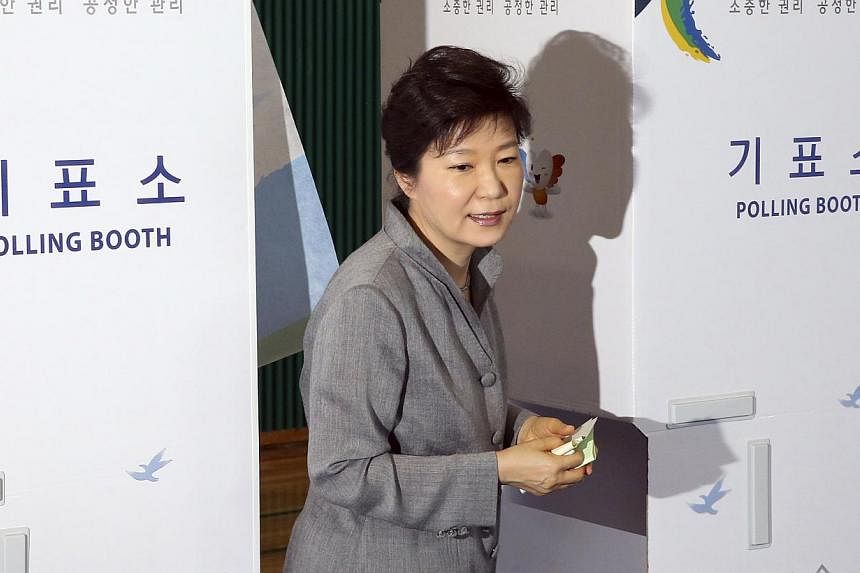SEOUL (AFP) - Exit polls in South Korean local elections on Wednesday signalled the tightest of contests in a ballot seen as a referendum on President Park Geun Hye's handling of the April ferry disaster that killed about 300 people.
The polls issued by three major TV stations after voting ended forecast that Park's ruling Saenuri party and the main opposition New Politics Alliance for Democracy (NPAD) would each win five of the 17 main races for metropolitan mayors and provincial governors.
Seven of the contests were too close to call, with final results only expected late in the night or Thursday morning.
Park's administration was sharply criticised for its response to the ferry tragedy and the polls were the first real opportunity to measure the severity of the political fallout on a national level.
With emotions still running high over the disaster, in which most victims were high school students, some had expected a particularly strong turnout.
But preliminary estimates put it at around 57 per cent, only slightly above the 54.5 per cent in 2010.
The high popularity ratings Park has enjoyed since taking in office in February 2013 have been hammered by the sinking of the 6,825-tonne Sewol on April 16 - the defining moment of her presidency so far.
Initial investigations exposed a culture of institutional negligence, greed and incompetence that contributed to the scale of the tragedy.
Although these problems have roots stretching back decades, Park and her officials have become a default focus for much of the public grief and anti-establishment anger.
"I really believe the ruling party should be punished for what they did, or rather didn't do, over the Sewol," June Kim, a 35-year-old office worker, said after voting in Seoul.
"They failed miserably ... and they deserve to be spanked for it."
The main opposition NPAD had put the ferry tragedy front and centre of its campaign, urging voters to see the election as passing judgement on the president.
Politics in South Korea, and especially local politics, have a strong regional bias, with entrenched support for certain parties that rules out any seismic shift in the national political landscape.
And Wednesday's exit polls suggested Park's Saenuri Party had largely avoided the destructive voter backlash over the Sewol disaster that the NPAD had sought to encourage.
In the most high-profile contest - the race for Seoul mayor - the exit polls predicted a clear win for the incumbent Park Won-Soon of the NPAD over his Saenuri rival Chung Mong-Joon.
President Park's predecessor, Lee Myung-Bak, was a former Seoul mayor and there has been widespread speculation that Park Won-Soon may consider a presidential run in 2017.
The too-close-to-call contests comprised a number of key races, including that for mayor of the second largest city Busan.
Busan has always returned a conservative mayor, but this time around the Saenuri candidate Suh Byung-Soo had faced a stiff challenge from an opposition-backed independent.
"Citizens of Busan, you made Park the president. Please help wipe away the tears she shed in the wake of the Sewol sinking," Suh had said in a final appeal to voters on Tuesday.
In a televised address to the nation last month, Park Geun-Hye tearfully accepted responsibility for the mishandling of the disaster.
An older voter in Seoul said she had chosen all Saenuri candidates as a show of support for Park.
"I think the president and the other officials did the best they could with the ferry accident," said the 57-year-old, surnamed Nam.
Several leading newspapers criticised both parties for portraying the election as a vote for or against Park.
"The election should be about evaluating the past performance of local governments and electing new local leaders," the Dong-A Ilbo said in an editorial.
"It is entirely up to voters to define what these elections should be about, regardless of what politicians say." it added.

